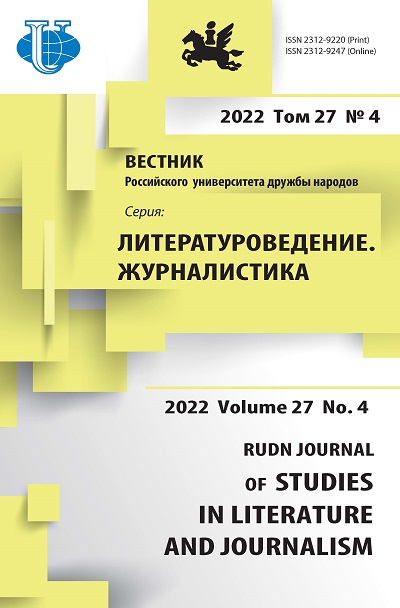Формирование предвыборного политического дискурса в аудиовизуальных СМИ Грузии
- Авторы: Скворцова Н.1,2, Волкова И.И.2, Сихарулидзе А.3,4, Абазов Д.2, Довлатова А.2,5
-
Учреждения:
- Грузино-российский общественный центр имени Е.М. Примакова
- Российский университет дружбы народов
- Грузинский институт общественных проблем
- Тбилисский государственный университет имени И. Джавахишвили
- Российский экономический университет имени Г.В. Плеханова
- Выпуск: Том 27, № 4 (2022)
- Страницы: 788-807
- Раздел: Журналистика
- URL: https://journals.rudn.ru/literary-criticism/article/view/33290
- DOI: https://doi.org/10.22363/2312-9220-2022-27-4-788-807
- ID: 33290
Цитировать
Полный текст
Аннотация
На основе качественного и количественного анализа аудиовизуального материала двух грузинских СМИ представлена эмпирическая база исследования о формировании политических дискурсов и их влиянии на общественно-политическую жизнь страны. Изучен медийный контент за предвыборный период 2020 года (сентябрь - октябрь): 2337 публикаций аудиовизуального формата. Анализ телевизионных материалов представляет интерес для понимания информационной и политической среды в обществе, где медиаресурсы непосредственно связаны с различными группами интересов. В СМИ наблюдается высокая концентрация политического фактора, определяющего дискурс того или иного медиа. Принимая во внимание нарастающую политическую поляризацию в Грузии, средства массовой информации занимают соответствующую позицию по отношению к политическим силам и выстраивают дискурс, отвечающий интересам определенных групп акторов. Общественность получает идеологически обработанную информацию и, несмотря на демократизацию методов политической борьбы, находится в ситуации, когда политические силы в угоду партийным интересам используют дозированное информирование и дезинформацию как методы борьбы с оппонентами. Представленный анализ - один из первых результатов межвузовского проекта «Средства массовой информации в политических процессах Грузии», он важен для понимания трендов грузинских СМИ, относящихся как к внутренним, так и к внешним факторам. Результаты исследования раскрывают закономерности, присущие различным телеканалам в контексте медийного пространства и политической среды в Грузии.
Ключевые слова
Об авторах
Нино Скворцова
Грузино-российский общественный центр имени Е.М. Примакова; Российский университет дружбы народов
Автор, ответственный за переписку.
Email: nino.skvortsova@gmail.com
ORCID iD: 0000-0003-0470-7508
координатор проектов, Грузино-российский общественный центр имени Е.М. Примакова; политический обозреватель, информационно-аналитическая платформа «Пресс-клуб Джейран Медиа»; аспирант, кафедра публичной политики и истории государства и права, Российский университет дружбы народов
Грузия, Тбилиси, ул. Баку, д. 2; Российская Федерация, 117198, Москва, ул. Миклухо-Маклая, д. 10, корп. 2Ирина Ивановна Волкова
Российский университет дружбы народов
Email: volkova-ii@rudn.ru
ORCID iD: 0000-0002-2693-1204
доктор филологических наук, профессор, руководитель межвузовского проекта «Средства массовой информации в политических процессах Грузии», кафедра массовых коммуникаций
Российская Федерация, 117198, Москва, ул. Миклухо-Маклая, д. 10, корп. 2Арчил Сихарулидзе
Грузинский институт общественных проблем; Тбилисский государственный университет имени И. Джавахишвили
Email: info@archilsikharulidze.ge
ORCID iD: 0000-0002-3989-2451
докторант, Грузинский институт общественных проблем; приглашенный лектор, Тбилисский государственный университет имени И. Джавахишвили; эксперт ПИР-Центра и Российского совета по международным делам; основатель SIKHA Foundation
Грузия, Тбилиси, ул. Броссе, д. 2; Грузия, Тбилиси, пр. Чавчавадзе, д. 1Димитри Абазов
Российский университет дружбы народов
Email: dimitriabazov@gmail.com
ORCID iD: 0000-0002-8325-8650
аспирант, кафедра публичной политики и истории государства и права, Российский университет дружбы народов; политический обозреватель, информационно-аналитическая платформа «Пресс-клуб Джейран Медиа».
Российская Федерация, 117198, Москва, ул. Миклухо-Маклая, д. 10, корп. 2Ана Довлатова
Российский университет дружбы народов; Российский экономический университет имени Г.В. Плеханова
Email: ana.dovlatova1993@mail.ru
ORCID iD: 0000-0002-3091-9988
специалист, Центр по реализации образовательных программ, Высшая школа социально-гуманитарных наук, Российский экономический университет имени Г.В. Плеханова; аспирант, кафедра массовых коммуникаций, Российский университет дружбы народов
Российская Федерация, 117198, Москва, ул. Миклухо-Маклая, д. 10, корп. 2; Российская Федерация, 117997, Москва, Стремянный пер., д. 36Список литературы
- Наумов А.О. Традиционные и новые медиа как акторы «цветных революций» // Дискурс-Пи. 2018. № 3-4 (32-33). С. 79-87. http://doi.org/10.17506/dipi.2018.32.3.7987
- Телоев И.Д. Основное содержание и характер проблематики грузинских СМИвпериод правления Михаила Саакашвили // Вестник Воронежского государственного университета. Серия: Филология. Журналистика. 2016. № 4. С. 127-132
- Тоффлер Э. Метаморфозы власти. М.: ACT, 2003. 669 c
- Burrage M. Myths and mass media // European Journal of Sociology. 1969. Vol. 10. No 2. Pp. 238-253
- Gurevithc M., Blumler J.R. Political communication systems and democratic values // Media power in politics / ed. by D.A. Graber. Washington: CQ Press, 1994
- McQuail D. Media performance assessment in the public interest: principles and methods // Annals of the International Communication Association. 1991. Vol. 14. No 1. Pp. 111-145. http://doi.org/10.1080/23808985.1991.11678782
- Ortega y Gasset J. The dehumanization of art and other essays on art, culture, and literature. Princeton University Press, 1968
- Pye L.W. Communications and political development. SPD-1 (Studies in Political Development). Princeton University Press, 1967
Дополнительные файлы















